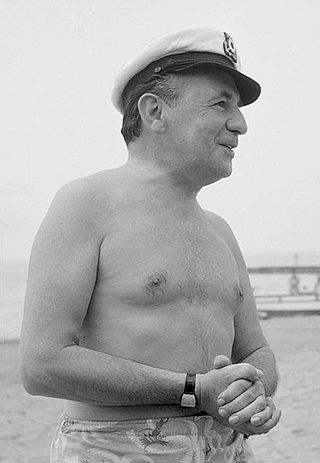Related Research Articles

The Umbrellas of Cherbourg is a 1964 musical romantic drama film written and directed by Jacques Demy, with music by Michel Legrand. Catherine Deneuve and Nino Castelnuovo star as two young lovers in the French city of Cherbourg, separated by circumstance. The film's dialogue is entirely sung as recitative, including casual conversation, and is sung-through, or through-composed, like some operas and stage musicals. It has been seen as the middle part of an informal "romantic trilogy" of Demy films that share some of the same actors, characters, and overall look, coming after Lola (1961) and before The Young Girls of Rochefort (1967). The French-language film was a co-production between France and West Germany.

Manfred Krug was a German actor, singer and author.

Don Quixote, Op. 35 is a tone poem by Richard Strauss for cello, viola, and orchestra. Subtitled Phantastische Variationen über ein Thema ritterlichen Charakters, the work is based on the novel Don Quixote de la Mancha by Miguel de Cervantes. Strauss composed this work in Munich in 1897. The premiere took place in Cologne on 8 March 1898, with Friedrich Grützmacher as the cello soloist and Franz Wüllner as the conductor.

Fritz Umgelter was a German television director, television writer, and film director.

Santiago Ziesmer is a Spanish-born German actor.

Léonide Moguy was a Ukrainian, French and Italian film director, screenwriter and film editor.

Theo Lingen, born Franz Theodor Schmitz, was a German actor, film director and screenwriter. He appeared in more than 230 films between 1929 and 1978, and directed 21 films between 1936 and 1960.
Ernst Fritz Fürbringer was a German film actor. He appeared in 130 films between 1933 and 1983. He was born in Brunswick, Germany and died in Munich, Germany.
Rudolf Ernst Paul Schündler was a German actor and director. He played "Karl" in The Exorcist (1973).
Benno Sterzenbach was a German cinema and theatre actor and director.
Hellmut Lange was an actor and journalist who became famous as an action hero on TV and eventually succeeded as presenter on popular TV show Kennen Sie Kino? or Do You Know Film?

Sonja Sutter was a German film actress. She was one of the few actors that was allowed to appear in productions in both East and West Germany. She is remembered for her role as Fraulein Rottenmeier in the German TV series Heidi from 1978. This series aired in many countries in Europe during the 1980s and 1990s, and was dubbed into several languages. She is also remembered for having had several roles in the TV series Derrick from 1983 to 1998.

Axel Stein is a German actor and comedian.

Ezio Carabella was an Italian operetta, song and film music composer. He provided music for several films directed by Mario Camerini, among others. He was the father of the actress Flora Carabella.
Hilde Sessak was a German actress who appeared in more than ninety film and television series during her career. She appeared in a number of films during the Nazi era including Quax the Crash Pilot (1941).

Ellen Schwiers was a German actress of stage, film, and television. She was featured in world premieres of plays by Dürrenmatt and Frisch at the Schauspielhaus Zürich, and appeared as Buhlschaft in Jedermann at the Salzburg Festival. In a career from 1949 to 2015, she also appeared in more than 200 films and television shows, including popular series such as Tatort. She also directed plays, founded a touring theatre company in 1982, and was Intendant of a festival from 1984.
Rolf von Sydow was a German film director and author.
Hans (Johannes) Gustav Winckelmann, also Hans Winkelmann, was a German operatic tenor and opera director.

Kurt Julius Sterneck was an Austro-German stage and film actor, radio drama narrator and director.
References
- 1 2 "Newcomers Lead Noteworthy Film". The Valley News. April 4, 1965 p. 49.
- 1 2 "Max Pierre Schaeffer: 'Sie werden es nicht für möglich halten'". Quick . February 12, 1969. p. 41
- ↑ Shakespeare Jahrbuch, Volume 98. Heidelburg: Quelle. 1962 OCLC 847201398.
- ↑ "Double Fanny". Newsweek. June 1, 1964. p. 83.
- ↑ A.B. (February 26, 1965). "Movies: Les Parapluies de Cherbourg". McGill Daily Panorama. p. 11.
- ↑ McNear, Betty (July 8, 1965). "French Saves Over-Hued 'Umbrellas'". The Evening Journal. p. 29.
- ↑ Lebon, Eric Antoine (2018). Léonide Moguy: Un citoyen du monde au pays du cinéma . Paris: L'Harmattan. p. 9. ISBN 978-2-343-15364-3.